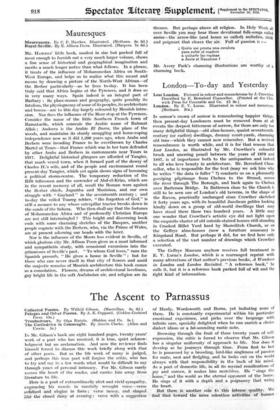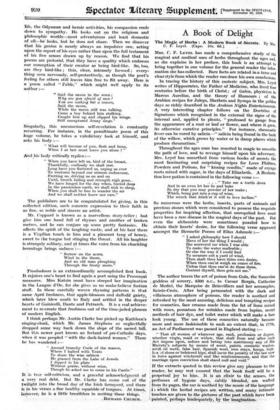The Ascent to Parnassus
IN Mr. Gibson's book are eight hundred pages, twenty years' work of a poet who has received, it is true, quiet acknow- ledgment but no acclamation. And now the reviewer finds himself forced to discuss this work briefly along with that of other poets. But so the life work of many is judged, and perhaps this true poet will forgive the critic, who has to try and say in a few words what would be difficult to say through years of personal intimacy. For Mr. Gibson surely moves the heart of the reader, and carries him away from literature to life.
Here is a poet of extraordinarily alert and vivid sympathy, expressing his moods in carefully wrought verse—verse subdued and elegiac in form-; verse mossy, and shaped like the closed daisy at evening ; verse with a suggestion
of Hardy, Wordsworth and Bums, yet imitating none of them. He is constantly experimental within his particular emotional experience, and picks over the language with infinite care, specially delighted when he can snatch a choice dialect idiom or a fat-sounding rustic note.
Browsing through the fruit of these twenty years of self- expression, the critic is forced to observe that Mr. Gibson has a singular uniformity of approach to life. Nor does it develop as he journeys through time. From first to last he is possessed by a brooding, bird-like singleness of passion for mate, nest and fledgling, and he looks out on the world always with that responsibility in the back of his mind. As a poet of domestic life, in all its myriad ramifications of joy and sorrow, it makes him matchless. He " sings the home," and the world as the eternal opponent of the home. He sings of it with a depth and a poignancy that wring the heart.
But there is another side to this intense quality. We find that toward the more relentless activities of human life, the Odyssean and heroic activities, his compassion-cools down to sympathy. He looks out on the religious and Philosophic worlds—most adventurous and least domestic of all--he looks, but he does not share. Then we discover that his genius is nearly always an impulsive one, acting upon the report of his eyes rather than upon the full testament of his five senses drawn up by reason. We find that his poems are pictorial, that they have a quality which endorses our conception of their creator as being bird-like. So, too, are they bird-like ; thin, clear, intensely focused ; every- thing seen nervously, self-protectively, as though the poet's feeling for others still leaves him free to flit away. Here is a poem called " Fable," which might well apply to its author
" Said the raven to the wren : Why are you afraid of men I You are nothing but a craven, Said the raven,
While the raven still was talking, Came a boy behind him stalking, Caught him up and clipped his wings.
Still uncaptured Jenny sings."
Singularly, this unconscious self-revelation is constantly recurring. For instance, in the penultimate poem of this huge volume, he takes a valedictory look at himself, and asks his body :—
" What will become of you, flesh and bone,
When I at last must leave you alone ? "
And his body critically replies:— "When you have left us, bird of the breast, Thankfully, endlessly we shall rest. Long have you fluttered us, urging us over To ventures beyond our utmost endeavour, Fretting us, driving us on and on Until, breath failing and strength nigh gone, . We have longed for the day when buried deep In the passionless earth, we shall ;riink to sleep, When you shall be free to wander the air And we shall neither know nor care."
The publishers are to be congratulated for giving, in this collected edition, such concrete expression to their faith in so "fine, so noble and sincere an artist.
Mr. Coppard is known as a marvellous story-teller ; but give him one hand full of rhymes and another of broken metres, and he can conjure up some pretty fantasies. He affects the spirit of the laughing rustic, and at his best there is a Virgilian touch in him and a pleasant tang of honey, sweet to the tongue but stinging the throat. All his laughter is strangely solitary, and at times the voice from his chuckling hermitage brings sadness :—
" Sorrow on the acres,
Wind in the thorn,
And an old man ploughing Through the frosty morn."
Troubadours is an extraordinarily accomplished first book. It rejoices one's heart to find again a poet using the Provencal measures. Miss Katzin must have steeped her imagination in the Langue d'Oc, for she gives us no make-believe fustian stuff. In these carefully woven rhyming patterns is that same April freshness, that apple-blossom and daffodil gaiety, which later blew south to Italy and settled in the deeper hearts of Guinicelli, Dante and Petrarch. It is a real achieve- ment to re-create that freshness out of the time-jaded phrases of modern English.
J think perhaps Mr. Austin Clarke has picked up Kathleen's singing-cloak, which Mr. James Stephens so neglectfully dropped some way back down the slope of the sacred hill. But this newer poet knows an Ireland of pre-Catholic days, when it was peopled "-with the dark-haired women." There he has wandered :—
" Around branchy Coole of the manor,
Where I halted with Yeats To share the wise sahton He grassed from the Lake of Jewels I dipped in his plate Without praise, without wine, Though he asked me to come to his Castle."
It . is true self-criticism, and a graceful acknowledgment of a ;very real debt. But Mr. Clarke has come out of the twilight into the broad day' of the Irish farmyard, and there ■ is in his Verses a fine healthy squabble of tongues. At.times, ho%vever, he is a little breathless in reciting these things. .RICHARD CHURCH.































































 Previous page
Previous page